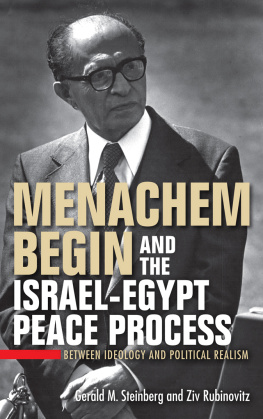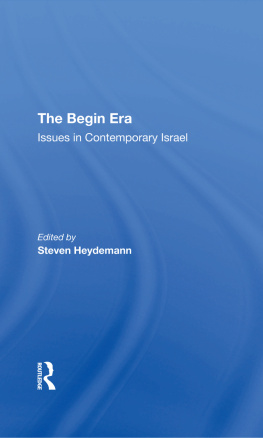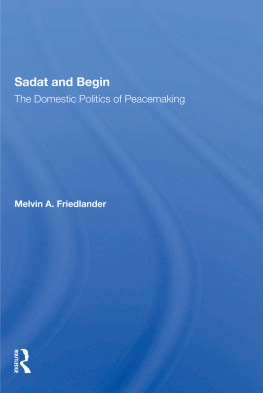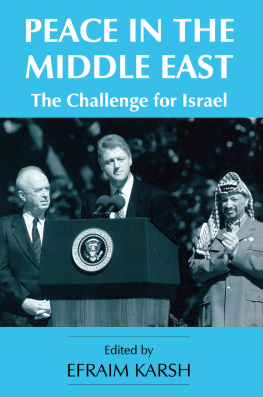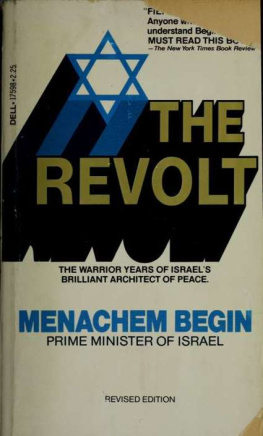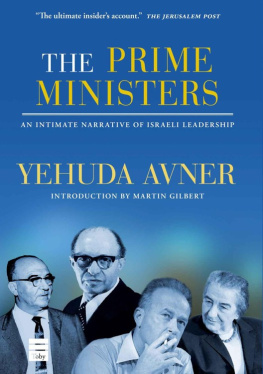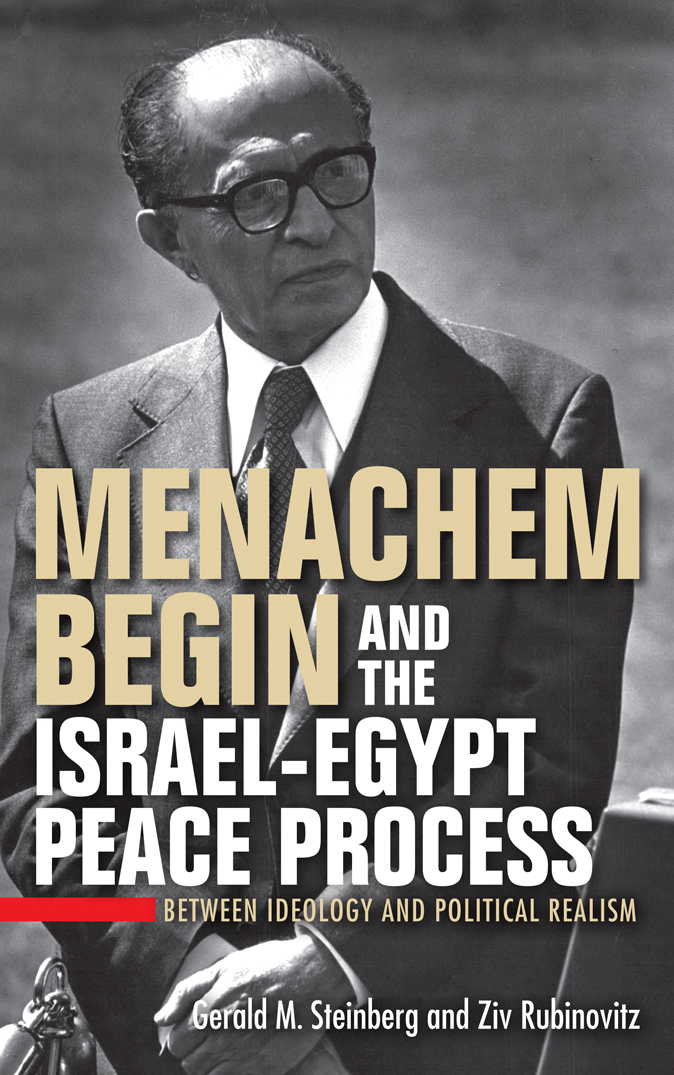Table of Contents
Guide
MENACHEM BEGIN AND THE ISRAEL-EGYPT PEACE PROCESS
PERSPECTIVES ON ISRAEL STUDIES
S. Ilan Troen, Natan Aridan, Donna Divine, David Ellenson, and Arieh Saposnik, editors
Sponsored by the Ben-Gurion Research Institute for the Study of Israel and Zionism of the Ben-Gurion University of the Negev and the Schusterman Center for Israel Studies of Brandeis University

This book is a publication of
Indiana University Press
Office of Scholarly Publishing
Herman B Wells Library 350
1320 East 10th Street
Bloomington, Indiana 47405 USA
iupress.indiana.edu
2019 by Gerald M. Steinberg and Ziv Rubinovitz
All rights reserved
No part of this book may be reproduced or utilized in any form or by any means, electronic or mechanical, including photocopying and recording, or by any information storage and retrieval system, without permission in writing from the publisher. The paper used in this publication meets the minimum requirements of the American National Standard for Information SciencesPermanence of Paper for Printed Library Materials, ANSI Z39.48-1992.
Manufactured in the United States of America
Library of Congress Cataloging-in-Publication Data
Names: Steinberg, Gerald M., author. | Rubinovitz, Ziv, author.
Title: Menachem Begin and the Israel-Egypt peace process : between ideology and political realism / Gerald M. Steinberg and Ziv Rubinovitz.
Description: Bloomington, Indiana : Indiana University Press, [2019] | Series: Perspectives on Israel studies | Includes bibliographical references and index.
Identifiers: LCCN 2018049713 (print) | LCCN 2018050671 (ebook) | ISBN 9780253039552 (e-book) | ISBN 9780253039521 (cl : alk. paper)
Subjects: LCSH: Begin, Menachem, 1913-1992 | Prime ministersIsraelBiography. | IsraelForeign relationsEgypt. | EgyptForeign relationsIsrael. | Arab-Israeli conflict1973-1993Diplomatic history.
Classification: LCC DS126.6.B33 (ebook) | LCC DS126.6.B33 S74 2019 (print) | DDC 956.04dc23
LC record available at https://lccn.loc.gov/2018049713
1 2 3 4 5 24 23 22 21 20 19
Citizens of Israel, when you hear these words, it will be morning. It will be an early hour and the sun will rise on the land of our Forefathers and Sons.
Will we be able to come to you within a few days and sing along, We have brought peace unto you?
This I can tell you: As we have made every possible human effort to bring it, we will continue so that every one of us can say, Peace has come to our people and our land, not only for the current generation but also for generations to come.
With Gods help, together we will accomplish this goal and will be blessed with good days of construction, brotherhood, and understanding. May this be Gods will.
Prime Minister Menachem Begin, speaking in Hebrew to the citizens of Israel, at the signing ceremony of the Camp David Accords at the White House, September 17, 1978
Contents
T HE SUCCESSFUL NEGOTIATION of a peace treaty between Israel and Egypt and the fact that this treaty has held for four decades are remarkable achievements in the realm of diplomacy and international relations. While many other attempts to negotiate viable peace agreements have sought to emulate this success, including for the unresolved parts of the Arab-Israel conflict, most have failed. The central question that we and many other authors who have examined the negotiations between Menachem Begin and Anwar Sadat have sought to answer is: Why? What were the key factors that led to success, and how can these be repeated in other cases?
Although the story of these negotiations has been told many times, a central part has largely been missingspecifically, the perspectives and strategies of Prime Minister Begin. In this volume, we reexamine and reassess these eventsfrom the initial secret meetings leading to Sadats dramatic arrival in Jerusalem and through the pivotal Camp David summit and the final signatures on the treaty.
To understand Begins views and policies as prime minister and the story of the negotiations with Egypt, we need to go back and trace their evolution. Thus, after providing some background on Begins early years and as leader of the Irgun underground, we begin our study with the MayJune crisis preceding the 1967 Arab-Israeli War, during which Begin joined the National Unity Government under Prime Minister Levi Eshkol. Begins participation in the events and debates beginning before the war, and continuing in its aftermath, particularly regarding the future of the occupied territories, were central in the formation of his policies during the crucial peace negotiations with Egypt.
Our analysis primarily focuses on Begin, who did not write memoirs or grant many interviews after leaving office. And while many of the other players, including senior Israeli ministers, published their versions, these were mostly personal accounts in which Begins role as chief negotiator and decision maker was diminished, whether by design or oversight.
In any political or social process as complex as peace negotiations between two longtime enemies, the histories that are written are likely to reflect particular perspectives while neglecting others. In addition to the Israeli memoirs, the American participants, including President Jimmy Carter, have published extensively on these events, particularly regarding the Camp David summit of September 1978. The interpretation of central issues, including the relationship between Begin and Carter, has been largely shaped by the latters extensive diaries and public statements, as well as the memoirs of Carters aides.
While this practice is understandable, it leaves the historical record incomplete and inaccurate. One of the major differences concerns the emphasis regarding the two central strands in the negotiationsone focusing on Egyptian-Israeli bilateral issues, summarized as land for peace, and the other on the Palestinian dimension, which was ultimately dealt with through an agreement to negotiate a nonterritorial form of autonomy. The Israeli histories tend to focus on the Egyptian-Israeli strand, while the American histories and analyses give more attention to the difficult negotiations on autonomy between Begin and Carter. In some ways, these two sets of emphasis present quite different versions of the events. In addition, for both groups, the image of Begin was secondhand, meaning that they relied on what other actorsCarter, Secretary of State Cyrus Vance, Foreign Minister Moshe Dayan, and Defense Minister Ezer Weizmansaid about the Israeli prime ministers goals, priorities, and strategies.
As a result, our first objective in undertaking the research that led to this publication was to fill the major gap in the historical record and to compare the existing accounts from Americans, Israelis, Egyptians, and others with the evidence that presents Begins point of view. Of course, we do not pretend to be able to write a memoir or diary in place of the ones that Begin never wrote, but we are able to raise questions and provide some answers based on a very detailed and comprehensive analysis of Begins own words and actions during this period.
In this process, we have benefited from numerous Israeli and American government documents and records that have become available in recent years, almost four decades after the events themselves. Begins powerful and eloquent voice is now accessible through protocols and other documents that record and summarize the meetings, negotiation sessions, and internal debates, and we have given it the attention we believe it deserves. The full texts of the relevant documents are available on the dedicated website created to accompany this publication, at this link: https://www.begincenter.org.il/menachem-begin-israel-egypt-peace-process-ideology-political-realism/.
Next page
